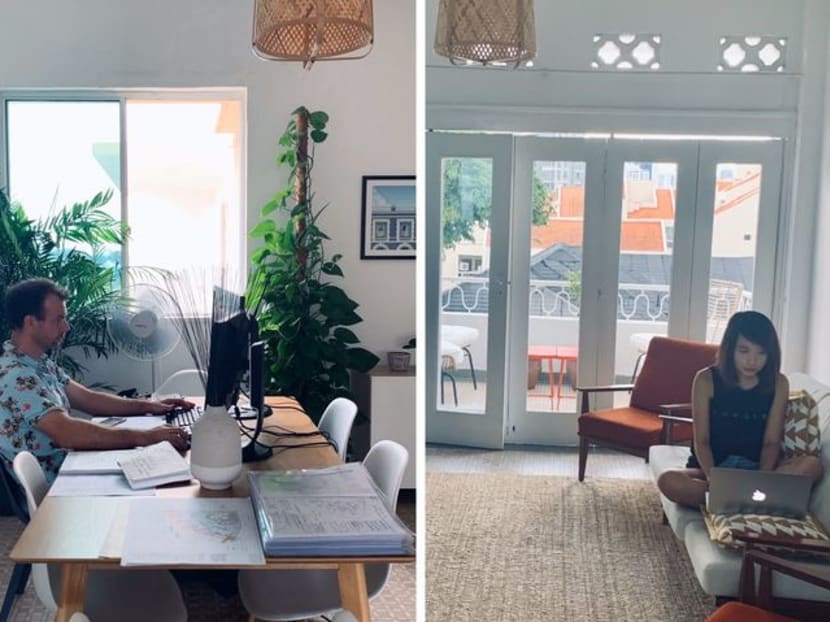Gen Y Speaks: When it hit me that it is Covid grief we’re feeling

Working from home is the new normal for the author and her partner (as pictured). She says they are beating the Covid grief by exercising more and making mealtimes special.
It was mid-March when things started to go awry, haywire, bonkers, bats even.
I had just begun working from home and in a span of a few days, I would experience a pendulum of emotions, seesawing from anger, detachment and motivation, to fear, love and gratitude.
For an unflappable person, this emotional chaos was unnerving and telling. Then it struck me: It’s grief I’m feeling.
This is my response to loss, specifically that of my life before Covid-19 struck.
There was no name for the loss. So I thought to coin a term, Covid grief, to abstractly embody the tangle of emotions — both good and bad — encountered as a result of the pandemic.
Then, wanting to know if this grief was common, I reached out to friends, aged 25 to 60, including one who had tested positive for Covid-19.
Through an online — by no means scientific — questionnaire I created, I set out to uncover if others identified with Covid grief.
As predicted, Covid grief is relatable, and likely even a communal phenomenon just as much a pandemic perhaps as the coronavirus.
From the poll, eight in 10 friends reported swinging back and forth between positive and negative feelings, and having had great and challenging days since the outbreak.
For instance, an emcee and presenter friend shared that worry and fatigue have lately dominated her emotions, because her “mind has been on overdrive” as she tries to find ways to make up for lost income.
However, love and hope have featured strongly too, helped by apps that virtually connect her to friends as well as music.
As for the friend diagnosed with Covid-19 who has since recovered, detachment, a sense of loss, and love have stood out.
He said: “While isolated and positive with the virus, I have been overwhelmed by the love and support from family, friends, colleagues, and people I hardly know who have reached out to wish me well.”
According to a multiple-choice question in the survey, the most commonly-cited feelings were, in this order:
Negative:
- Uncertainty
- Stress
- Anxiety
- Restlessness
- Detachment
Positive:
- Love
- Gratitude
- Motivation
- Hope
- Relaxation
That uncertainty is burdening us the most is not surprising. We are in a dynamic and ambiguous situation, with constantly-changing updates and rules. Yet, there hasn’t been a clear indication of how and when this would all end.
My friends’ advice? Focus on the things we can control, and make alternative, incremental arrangements where possible. Oh, and don’t feel like you always have to keep up with the latest developments
Going by the poll findings, motivation is the most productive emotion.
It consistently manifests in the following: An increased amount of exercising; the starting of a business; a shift to healthier eating; or the adoption of a charity.
A friend who adopted a charity and got both her daughters to think of ways to fundraise too, hailed it as a winning distraction during this period, and a way to keep “positive and chirpy”.
Anger had been erroneously omitted as an option from the multiple-choice question, a negligence I attribute to my emotional chaos.
Without a doubt a significant emotion in Covid grief, anger fundamentally stems from our being told that our lives are going to dramatically change and there is little we can do about it.
For that reason, anger would have been my top pick among negative emotions.
Since the pandemic hit, I have been most affected by deprivation of the ability to socialise with loved ones, dine in at restaurants and bars, and watch and play sport. To boot, various things seem to easily perpetuate that anger.
Even when I step outside for a run (a privilege I’m thankful to retain as I enjoy the outdoors), I could be peeved at the sight of crosses — usually marked by angry red tape — on benches, which signal those are off limits.
These sitting areas, once welcoming spaces for people to take a break or socialise, are now no different from mines: Sit and you could be struck with a fine.
The pettiest things too now startlingly irk me.
These include finding out that all but one entrance to a mall are closed, or not being able to use Face ID on my iPhone to pay at supermarkets as I have a face mask on, the result of a safety precaution in Singapore.
With my iPhone no longer recognising my concealed face, I have to laboriously enter a passcode to use Apple Pay. I’m only half kidding but imagine that!
Anger aside, I have been feeling plenty of love and motivation, what would have been my chief choices for positive emotions.
I’ve been enjoying the company of my partner as we embark on our latest adventure. That is, leading nearly all of our lives from our apartment now, where we have been living together for a year.
I’ve also been checking in with friends and family to ensure they are well, exercising more, and looking forward to mealtimes, where we would whip up cool dishes, and on special days, fire up the barbeque or hotpot.
I definitely count myself fortunate.
We are all forging a new normal. Even as we are Covid grieving, we are learning to cope and rising to the occasion.
The whirl of emotions and accompanying discomfort are only triggers for the realisation that the world has changed and a new mental model is required.
Life will never be the same, but I think we will be okay.
ABOUT THE AUTHOR:
Jacquelyn Cheok is a former journalist who now works in the tech industry.






